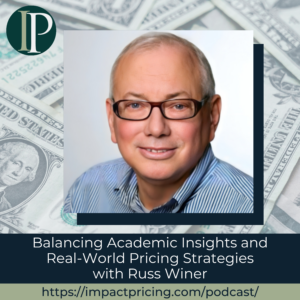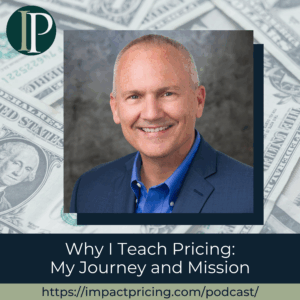Russ Winer is a William H. Joyce Professor of Marketing, Stern School of Business, New York University. His specialties include pricing, new technologies, consumer choice models, and advertising.
In this podcast, Russ discusses the critical role of understanding consumer behavior in pricing decisions, emphasizing the importance of considering how customers will react to price changes. He explains the difference between academic theories and practical applications in marketing and also highlights the growing shift of research from academia to industry, particularly in data-driven fields like marketing, and stresses the need for businesses to stay competitive while balancing consumer protection and profitability.
Podcast: Play in new window | Download
Why you have to check out today’s podcast:
- Gain practical advice on how businesses can align their pricing strategies with consumer behavior for maximum impact.
- Discover the unique perspectives on how academic research shapes real-world marketing practices and why general theories can be a game-changer for business strategies.
- Learn about the challenges and opportunities in both B2B and B2C markets, including data availability, decision-making processes, and competitive pressures.
“Don’t forget the consumer, or customer, if it’s B2B, when you’re thinking about the price. How is the customer or consumer going to react when you take this particular action?”
– Russ Winer
Topics Covered:
01:48 – One accomplishment that brings Russ great pride
02:13 – Describing his entry into pricing
03:56 – Clarifying that he did not introduce the concept of reference price, though he was the first to incorporate it into empirical models
04:45 – Distinguishing reference pricing from behavioral economics
06:40 – How context influences reference prices, highlighting the relevance of acquisition and transaction utility in pricing
08:08 – Explaining the psychology behind 99-cent pricing
09:50 – Discussing deceptive pricing, highlighting practices like false markdowns in both brick-and-mortar stores and online retail
11:59 – Comparing deceptive pricing to deceptive advertising
14:33 – Differentiating between academics and practice in marketing
17:23 – The data availability challenges between B2C and B2B research
20:20 – Reflecting on the shift of research dominance from academia to industry
25:44 – How marketers’ strategies to influence reference prices are not inherently harmful to consumers
28:14 – Russ’s one best pricing advice
Key Takeaways:
“It’s not just the firm side that’s important when we think about pricing, it’s also the consumer side, how they react to the prices that we’re putting in the marketplace.” – Russ Winer
People/Resources Mentioned:
- Bob Lucas: https://en.wikipedia.org/wiki/Robert_Lucas_Jr.
- Richard Thaler: https://en.wikipedia.org/wiki/Richard_Thaler
- Dan Kahneman: https://en.wikipedia.org/wiki/Daniel_Kahneman
- Amos Tversky: https://en.wikipedia.org/wiki/Amos_Tversky
- Facebook: https://www.facebook.com
- Airbnb: https://www.airbnb.com
- Google: https://www.google.com/
- Campbells: https://www.campbells.com/
Connect with Russ Winer:
- LinkedIn: https://www.linkedin.com/in/russ-winer-4b69b7/
- Email: [email protected]
Connect with Mark Stiving:
- LinkedIn: https://www.linkedin.com/in/stiving/
- Email: [email protected]
Full Interview Transcript
(Note: This transcript was created with an AI transcription service. Please forgive any transcription or grammatical errors. We probably sounded better in real life.)
Russ Winer
Don’t forget the consumer, or customer, if it’s B2B, when you’re thinking about the price. How is the customer or consumer going to react when you take this particular action?
[Intro / Ad]
Mark Stiving
Welcome to Impact Pricing, the podcast where we discuss pricing, value, and the strong relationship between them. I’m Mark Stiving and I run boot camps to help companies get paid more. Our guest today is Russ Winer. Here are three things you want to know about Russ before we start. He is the William H. Joyce Professor of Marketing at NYU. Okay, that sounded formal and official. Probably the most important thing about Russ in my life is he was my dissertation advisor at UC, Berkeley. And the co-author of my first published paper. Russ just retired and I was invited to speak at his retirement, and instead of a party, they actually threw a conference. There were incredible luminaries from marketing academics, so Don Lehman, John Lynch, Rick Stalin, so many more people that if you were in marketing academics, you would know them. So I actually didn’t realize Russ was a superstar. So, welcome, Russ.
Russ Winer
Thanks, Mark. I don’t know if superstar is the right way to characterize me, but I’ll take it.
Mark Stiving
Okay. Well, I want you to brag one more minute and then we’ll jump into something interesting and thoughtful. So, besides being my doctoral advisor, what’s the one accolade in your career that you’re most proud of? Because I didn’t list the hundred of them there.
Russ Winer
That’s a hard question. I think in terms of awards, I think probably the most prominent is I was named a legend of marketing by the American Marketing Association a few years ago. So, that’s pretty strong. I think so. I’m pretty proud of that.
Mark Stiving
That is very strong. Very strong. So, hey, real quick question. How did you get into pricing?
Russ Winer
Well, actually my doctoral dissertation was on advertising, and I’ve always been interested in advertising, as well, probably about as much as pricing. And my early research was on advertising effectiveness using field experiments which are, of course, big today. And while I was a doctoral student at Carnegie Mellon, there was a very famous economist there named Bob Lucas, who eventually won a Nobel Prize for something called Rational Expectations. And it had to do with the fact that consumers form expectations of prices and traditional macroeconomic models did not account for that. And so he and some colleagues basically revolutionized macroeconomics by incorporating consumer price expectations into macroeconomic models. And so, he gave a presentation. I read one of his papers, I don’t remember, it was a long time ago. And I said, ‘Gee, that’s probably what consumers are doing when they go to the point of purchase.’ They have some kind of expectations in their head about what they think the price is going to be. Then they get to the point of purchase, and mentally they compare the price that they observe to the price that’s in their head. And I called that price in their head reference price. And I developed a few papers around that concept. And that’s kind of how I got into pricing.
Mark Stiving
Nice. And so this concept of reference prices actually became a really big deal. A lot of people think about it, talk about it. So you are the inventor of the reference price?
Russ Winer
Actually, no. I mean, the concept had been around. What I did, which nobody else had done, was I incorporated the concept of reference price into what we call empirical models. That is using real data from supermarkets and showing that consumers actually use this reference price when they’re making purchases. Prior to that, it had just been a kind of a theoretical concept, but I was the first to actually show that it actually mattered.
Mark Stiving
Nice. So I spent a lot of my time especially on podcasts and writing, not quite making fun of behavioral economics, but downplaying behavioral economics quite a bit. Do you think reference prices are behavioral economics? Do they fit in the world of behavioral economics? What’s the role there and how do they relate to each other?
Russ Winer
Typically, when we talk about behavioral economics today we’re talking about the work of say somebody like Dick Thaler, Kahneman, Tversky, people like that who show that consumers are not necessarily rational when it comes to making decisions, right? So a lot of this work, it’s often called behavioral decision making or judgment decision making. That kind of research has been used to show that the sort of the economic man or woman that economists have long assumed, actually doesn’t hold. In fact, people are not that rational. They make, they have all kinds of heuristics, make mistakes in their judgments. And, I don’t really feel that that kind of reference pricing is in that vein. It’s certainly a behavioral concept, and I like to talk about that work being sort of behavioral pricing, right? When many people talk about pricing, they use economic models of supply and demand or other kinds of ways of modeling price, but they don’t often take the consumer side into it, right? How is the consumer reacting to the price that they’re seeing or what they’re reading about in the papers in terms of inflation. So it’s not just sort of the firm side that’s important when we think about pricing, it’s also the consumer side, sort of how they are reacting to the prices that we’re putting in the marketplace. So there’s definitely a behavioral aspect to it. And I don’t know if I would call it behavioral economics, but I certainly call it behavioral pricing.
Mark Stiving
Okay. And I think the whole reference price piece fits really well when you think about Thaler’s beer on the beach story, right? And he talks about acquisition utility versus transaction utility. So it feels to me like the reference price is transaction utility.
Russ Winer
Yeah. I mean, his ‘beer on the beach’ experiment showed that people would expect to pay a different price if they were buying it, say, in a store, or I don’t remember exactly a bar on the beach, right? Something we call context, right? And so people, price expectations would be different depending upon, say, the retail context in which they were buying. So, certainly there’s a behavioral economics aspect to that. And I was influenced a lot by Thaler’s work, although I didn’t use it, didn’t use it directly, but, he has a very famous article in the journal Marketing Science back in the 1980s where he talks about these kinds of utilities. And I would definitely recommend it to any listeners that they take a look at that paper, and I think they’ll understand a lot about pricing by reading that paper as well.
Mark Stiving
Yeah. I thought his acquisition and transaction utility was just really interesting to me. And so I tend, and maybe this is just wrong, but I tend to think of acquisition utility as selling the value of the product. And then I think of transaction utility as all of the other stuff that has nothing to do with selling value. and so I might think of the context that we just talked about. I might think of the last price I paid as a reference price. And in fact the paper that we did together was on 99 cents. I might think of 99 cents as behavioral in nature, more on the transaction side than on the value or acquisition side.
Russ Winer
Actually, now that you mentioned that 99 cents of the odd pricing stuff, I have a funny short story about that. I have a 10-year-old granddaughter, and she was shopping with my daughter and her mom, of course, and she saw prices in the store. I don’t know where they were, I think it was $17 and 99 cents, something like that. And she asked my daughter, why is there 99 cents after the price? Why do you know stores price it like that? And so my daughter passed along this question to me and I talked to her sometime after that about why stores use $17 and 99 cents. And we talked about basically the reason that people often look at prices and look at a certain digit in the price. So if they charged $18, it would look a lot more expensive than $17 and 99 cents. I don’t know how much of it sunk in, but it’s interesting that a 10-year-old consumer would notice that odd pricing phenomenon in the store.
Mark Stiving
Yeah. I usually start a lot of my talks off if I’m going to talk about that at all. And, I’ll just say, look, I remember being 10 years old or 12 years old, and going to the grocery and seeing prices that were 99 cents. And I always wondered, why do companies do that? Do they think we’re stupid? Right. We know that’s a dollar. So, that was fascinating. And I’m glad your granddaughter found it too.
Russ Winer
Yeah, she did.
Mark Stiving
So before we talk about a topic that I’m going to be really fascinated to just have a conversation with you about you had said something about wanting to talk about deceptive pricing. What do you mean when you say those words?
Russ Winer
Well, yeah, deceptive pricing, sadly, has been around for a long time. I think in a brick and mortar world when you go to a discount clothing store you often see the tags with different prices with a line drawn through them and then sort of a final price there. And of course, deceptive pricing is the idea that in fact, the store has not really marked down the price to what you see, indicating that they actually charged those prices through which the lines were drawn. And so, that final price that you’re looking at is in fact the deceptive price. And again, it’s not based on markdowns to make it look like there’s some kind of huge deal going on. And I think what we’re seeing a lot today is we’re seeing that kind of pricing going on on the web. And I was involved with some litigation as an expert recently. I won’t talk about the case, but basically that’s what happened, a competitor to the client that I was working with had done the same thing for this was more expensive, like a hundreds of dollars kind of item had one price scratched out and then a lower price to make it look like they had reduced the price significantly from the original price, when in fact, investigation showed that they had never, ever actually charged that original price. And in fact, the one that you could see was the price sort of a normal price that they were charging. So, I think that this concept of deceptive pricing, as I said, has been around for a long time. And the FTC has been interested in it for a long time as well. But, I think what’s interesting is that it’s definitely either moving or has moved to the internet as well.
Mark Stiving
I don’t know a lot about advertising and the rules, especially around advertising, but it feels to me like deceptive pricing is the exact same thing as lying in an ad. And so, if I was lying about a feature or capability that would be the same thing as lying, that says, ‘Hey, this used to be priced at this price.’
Russ Winer
I would not disagree with that. I think that the difference is that there are watchdogs in advertising. There are a number of different trade associations that kind of I don’t say are not limited, but certainly take a look at all the advertising that’s out there and will point out when something is deceptive and we don’t see that much anymore. There was certainly a lot of deceptive advertising around, or in the earlier days of advertising. The most famous example is Campbell Soup, where they used marbles in the soup when they showed the ad on TV or in a print ad to show the vegetables kind of floating on the top to indicate, wow, there’s a lot of vegetables in the soup when in fact, of course, if you make a bowl of vegetable soup, all the vegetables sink to the bottom. So Campbell’s had to take that advertising off the air. It’s very hard to police. The only people really policing the pricing that’s going on as a competitor. And in this case, it was a competitor that was my client that flagged this company that was using deceptive pricing. It’s pretty much the wild west out there, often in internet advertising, internet marketing. And again, it was a competitor that sued them. And they changed the price pricing policy. It’s kind of like deceptive advertising. I agree with that.
Mark Stiving
Yeah. And it seems obvious that you’re brought in because of the fact that that deceptive price is essentially trying to set a reference price. We’re trying to get people to believe this was the original price.
Russ Winer
Exactly. Right. Yeah. So the $99 that is scratched out and now it’s $69 is the reference price. People are saying, wow, they dropped the price $30 when in fact it never was priced at $99. And the company was just being deceptive on the reference price.
Mark Stiving
Nice. Russ, I want to change topics and talk about something that I just, I didn’t even think about this until I went back to your retirement conference, and I got to see the difference between academics and practice and it was extremely blatant. I haven’t been or even thought about academics for 20 years. And going to that conference again was so insightful and eye-opening to me. And so let me, first off, let me just toss that wide open softball to you. What do you see as the difference or the relationship between academics and practice when we start thinking about marketing?
Russ Winer
Well, I think that what academics do is, we try to develop a general theory, right? When you’re hired to be a consultant, say for a company which, like you do, you’re brought in to solve a particular problem that that company has. What academics do is we try to develop a more general framework that is not context specific. It might be somewhat context specific. For example it might be for say, a durable good versus a frequently purchased product, say you find in a supermarket. But otherwise it tends to be fairly context independent. And so the theory tends to be somewhat general. And so, if you find or develop a model and you develop some hypotheses, like if the price that you observe is higher than the reference price, the one that’s in your mind, that’s going to negatively affect the probability of you buying.
So, that might be a general hypothesis. And then what we do is we collect some data not every product category, and we empirically test that to a point that we’re fairly satisfied that that hypothesis is supported. And in the case of reference pricing, even though my original paper only had two product categories in it, it’s been replicated so many times that in fact it is now I’m going to call it truth. Okay. It’s something that exists. So I think, to answer your question, Mark, I think the difference between academia and practice is that we think from a more general perspective, we might start out from a specific perspective, a specific product or brand, but we try to develop more general theories that could be applicable in different situations.
And, in fact, there’s an old saying, right? There’s nothing as practical as a good theory. And I think academics truly believe that if you have a good theory and it turns out to be supported by data, then you do have something to say to practitioners. Some of it is just that we enjoy doing what we do and don’t want to work for a company, right? So we prefer thinking at our desk than working for a boss. So some of it’s more lifestyle and individual kind of things that academics are interested in. But I think that academics are actually interested in practice, it’s just we hit it from a different angle.
Mark Stiving
Yes. So before I take it to the next step, comment on B2C versus B2B for a second. I live in the B2B world, but almost all of the research I was watching at the conference is in the B2C world. Do you have a thought on that?
Russ Winer
Well, I think B2C is definitely more popular just because of data availability. I mean there’s so much like scanner data and now, social media data that are available for frequently purchased products and consumer products that I think people are necessarily drawn to that. I think certainly social media data is available for B2B as well, but it’s just not as voluminous and it’s much harder to collect B2B data. There’s not as many kinds of standard data collections. There’s not like a Nielsen that collects scanner data at point of purchase. You have to dig a lot harder. I think that that’s probably the reason there’s been more research in B2C than B2B, but clearly B2B I think in aggregate, I think it is even a bigger aggregate number, dollar number in terms of business than B2C. So, I think its sort of data availability is, my guess, has been been the main driver behind the attractiveness of B2C research.
Mark Stiving
I think that makes a lot of sense. Data availability is probably one of the big drivers. Also, it makes sense to me that in the world of B2C, you typically have a single decision maker, and so it’s easier to test that. And in B2B, we often sell to committees of people, and you don’t know which department is going to buy it, and that’s…
Russ Winer
Right. Except in the case of expensive, durable goods like automobiles or real estate where maybe a couple people would be involved, B2C tends to be individuals choosing their favorite soft drink, right? In a store or food and drug place. So, yeah, I think that’s certainly the case.
Mark Stiving
Yeah, and ,what’s interesting is, conjoint analysis, of course, we think about that in the world of B2C, but it turns out we use it a lot in the B2B world which just, it depends on who it is that you get to do, be the respondents.
Russ Winer
Yes. I think there’s no really, I mean, conjoint is just a data analysis method. But, I agree with you. I think that we’re in a B2C context, you might run a conjoint on say, one consumer you would need to understand the utility function of the buying center or everybody involved with the purchase in a B2B setting. So it’s definitely more complicated. Yeah.
Mark Stiving
Interesting. So one of the people, and I apologize for not remembering who it was, but one of the people at your conference had talked about how industry was now doing more research or deeper research than academics are. And so when you start thinking of all of the scanner panel data or all of the data that’s out there, look at Amazon, Amazon’s probably not hiring academics to do research, Amazon’s hiring statisticians to do research. What are your thoughts on research moving into industry as opposed to being in academics?
Russ Winer
I think that’s a great question, and it’s one that I’ve actually thought about for a number of years, maybe 10 years, given the rise of the Facebooks and Airbnbs and Googles that have all this data, and I think at one time academics had a real edge over business, all right? I think as I said, academics were sort of working on general problems that I think many, many companies found useful. I felt, and I knew that in fact companies would hire consultants who could read our journals and take stuff from us for free. We’re not very good at protecting our IP and using it and I think that went on for a long time, but as you said, these companies, the internet companies say not just internet, big ones even small ones now have analytics people.
They hire PhDs in statistics or sometimes PhDs in marketing. And they’ve got tremendous intellectual assets in-house now. And my fear was that actually academic marketing was going to become almost obsolete because you had really top tier academic departments inside these companies that just had access to all of Facebook data, right? And all of Google data, instead of just sort of what academics do is kind of what’s called scraping it off the web. They run programs that can take, you know what, they can see, what you can see on the web, but it’s not, you don’t get under the hood the way people working in the companies do. And I think it’s still a problem for academics. I think I would have to say more and more the companies are opening up and giving access to data.
Many of these companies use academics as outside consultants or the academics go for a year and do sort of internal, maybe some consulting. And I think the Chinese companies have really been pretty open about giving data to academics. And you didn’t see it that much when you were at my conference, but what we call marketing science or the people that do quantitative work in marketing, relay is heavily populated by people from China. They get their PhDs in Western countries. But they have very good contacts then with companies in China and they’re using that data. So even if Facebook doesn’t allow outside academics to use much of their data there’s still some really interesting work going on because of the social media companies and internet and e-commerce companies in China there are weddings, academics use their information. So, I think it’s a very relevant question that you ask, and I think it’s one that concerns me. And I still think that I still worry about the edge that we have over the companies doing their internal work.
Mark Stiving
I think one of the edges that academics have is that they’re not biased or trying to achieve a goal. They’re just trying to learn the truth.
Russ Winer
Well, that’s, yeah, I mean, that’s certainly a problem, right? I mean, the companies are hiring their staffs to work on problems that they’re concerned about, right? Not general problems, but how to make search more efficient or how to utilize Facebook data, like data, et cetera, not sort of general issues. Academics are more interested in general questions. The problem with academics is that we tend to be slow, right? And I think that’s one of the things that’s slow in terms of getting the work done. Academics have other parts of their jobs, right? We’ve got teaching classes, we’ve got administrative work, we do our research, but a company has some information, they’ve got a business problem, and they can’t wait six months to a year, right, for an academic to get to it. So, I can sometimes understand their frustrations with working with people like me.
Mark Stiving
Yeah. So, the other thing that I found very fascinating at your conference is I always pictured marketing as how do I help companies make more money? And it certainly felt to me at the conference that marketing is more how do I protect consumers from big bad companies? What are your thoughts on that?
Russ Winer
Maybe I could rephrase that. I’m thinking about it, I’m not sure I quite understand.
Mark Stiving
Sure. So let’s go back to deceptive pricing for a second, right? So when we talk about deceptive pricing, what we’re really saying is, ‘Hey, this is a company that’s taking advantage of consumers.’ And so I could testify in court over the fact that, ‘Hey, this is really bad behavior when you think about reference pricing.’ I would’ve flipped that the other way and said, ‘Hey, we think about reference prices, and now the question as a company is, how do you influence your customer’s reference prices?’ Because the higher the reference price, the higher the price they’re actually willing to pay for your product, right? And so one is how do I help companies make more money? The other is, how do I protect consumers from companies?
Russ Winer
Well, I guess, I don’t see anything the marketer does to push up the reference price as hurting consumers. I think that we live in a world of, I think, extreme competition. I don’t think consumers are, they may be, some people might think they’re being manipulated to some extent, but there are, for every brand that’s trying to do that, there are several other brands that are available plus private labels that have become obviously very successful, especially since the pandemic. And there are other channels, right? Discount channels like and all the right, the German retailers have become very successful in the US by charging everyday low prices, having A-E-D-L-P strategy. So, I think what saves marketers is they still have to compete in the world of fairly intense competition. And I think we’re starting to see that actually, I think the days of inflation where the packaged goods companies could keep raising price with impunity are pretty much over. And I think that they’re starting to think about, well, did we raise them too much? Do we start to have to offer promotions, maybe price promotions to make the prices look lower? So I think it’s the competitive world I think limits the concept of, I think, consumer manipulation in the way you describe it.
Mark Stiving
Yeah, we’re definitely seeing prices coming down in the fast food world right now. They’re competing on price again all of a sudden.
Russ Winer
Yeah, I don’t know. What do you see in B2B? I don’t know which one is your bailiwick. Yeah.
Mark Stiving
So in the world of B2B, we don’t see that much commoditization of product. And so typically, once you’ve won a deal you get a customer that buys from you over and over and over again. And in the subscription world, or at least the reoccurring revenue world, it gives us room to raise prices. But if you go too far, then you lose a customer and that’s a bad thing. But there isn’t as much price pressure and I don’t see any price pressure to decrease prices where I do see that on the consumer side.
Russ Winer
Okay. Alright.
Mark Stiving
So, it sounds good. Pretty interesting. Russ, this has been fascinating. I just love talking to you, we could talk forever, but I want to ask the question I always ask. I hope it’s not a hardball for you. What is one piece of pricing advice you would give our listeners that you think could have a big impact on their business?
Russ Winer
I think the one piece of advice, something I mentioned earlier is, don’t forget the consumer, all right. Or customer, if it’s B2B when you’re thinking about the price. How is the customer or consumer going to react when you take this particular action? So you might say, well, it’s cost justified, right? Our supplier is raising its input costs. So we have to pass that along to the consumer. Well, just remember that the consumer has options and the consumer’s not responsible for your cost increases and therefore might find a different option. So I think my one message is just keep your eye on or your thinking on how is the customer going to react to this pricing decision?
Mark Stiving
Absolutely. That’s a spot on answer. Thank you, Russ. And Russ, thank you for your time today. If anybody wants to contact you, how can they do that?
Russ Winer
I think the best way is through email. My email address is R-W-I-N-E-R. My last name is spelled just like the beverage [email protected].
Mark Stiving
Excellent. And I think you are the first dot edu email address we’ve ever given out on this podcast.
Russ Winer
Okay. Well, I hope you do more.
Mark Stiving
We’re going to try. Okay. So, to our listeners, thank you for your time. If you enjoyed this, would you please leave us a rating and a review? And if you have any questions or comments about the podcast or if your company needs help getting paid what their true value is, feel free to email me, [email protected]. Now, go make an impact!
[Ad / Outro]
















